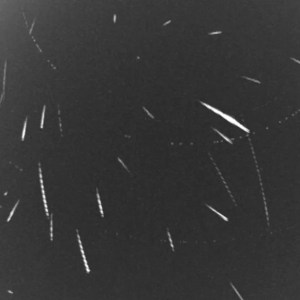Two meteor showers will light up the night sky this Wednesday morning, a rare event when Earth passes through debris from two comets. The Southern Delta Aquariids and Alpha Capricornids will reach their peak late Tuesday night into Wednesday morning.
The Southern Delta Aquariids have been active since July 18, while the Alpha Capricornids started on July 12. Combined, they could yield 20 to 30 meteors per hour, according to Nick Moskovitz, an astronomer at Lowell Observatory. This makes it a great time to catch a glimpse of “shooting stars.”
### What Are Meteor Showers?
Meteor showers happen when a lot of meteors fall in a short period. These meteors are bits of debris from comets and asteroids. When they enter Earth’s atmosphere, they burn up and become visible, creating trails of light.
### Details About the Southern Delta Aquariids
The Southern Delta Aquariids will peak overnight from July 29 to July 30. It’s best viewed in the Southern Hemisphere and will remain visible until August 12. Named after the constellation Aquarius, which is where the meteors appear to originate, this shower often brings a beautiful show to stargazers.
### Insights on the Alpha Capricornids
The Alpha Capricornids, while not as prolific, have a charm of their own—they tend to produce bright, slow-moving fireballs. Although they might only show five meteors per hour, these fireballs can be quite striking, especially during their peak from July 29 to July 30.
### How to Watch the Show
You don’t need any special gear to enjoy the meteor displays. Just find a spot away from city lights where you can sit back and relax. NASA suggests that your eyes will adjust to the darkness in about 30 minutes, making it easier to spot meteors. The optimal time to watch is after midnight on July 30. If you’re in North America, look toward the southern sky for the best view of the Southern Delta Aquariids.
Interestingly, the moon will be a Waxing Crescent during this period, about 25% full. This should enhance visibility, making it a perfect night to straddle your blanket and gaze at the stars.
### Current Trends and User Reactions
Social media is buzzing as people prepare for this celestial event. Hashtags like #MeteorShower and #ShootingStars are trending, with many sharing their plans and excitement. Stargazers are exchanging tips, highlighting the shared wonder around witnessing these awe-inspiring natural phenomena.
This meteor shower offers a unique opportunity to connect with nature and reflect on the universe’s beauty. Enjoy the show!
Source link
meteor showers, Southern Delta Aquariid, NASA, Alpha Capricornid, Delta Aquarii, Nick Moskovitz


